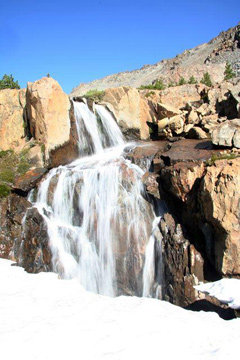Climate change already affecting water supplies in the Western U.S.
Climate change already affecting water supplies in the Western U.S.
mongabay.com
December 11, 2007
Climate change is already impacting water supplies in the western United States and is likely to reducer carbon sequestration by regional ecosystems, reports research presented at the fall meeting of the American Geophysical Union in San Francisco.
A study led by researchers at Scripps Institution of Oceanography reports that “trends in snowpack, river runoff, and air temperatures — three fundamental indicators of the status of the West’s hydrological cycle — point to a decline in the region’s most valuable natural resource, water, as population and demand grows in the West.”
The scientists, led by marine physicist Tim Barnett, say that observed changes are correlated to the climate impacts of human activity.
The models “portend a crisis,” said Barnett. “After the performance on the last 50 years of observations, we can put high confidence in their general predictions for the next 20 years, at least in the western United States.”

|
Meanwhile a second study by NASA scientists warns that warming air temperatures forecast under future climate scenarios, show that ecosystems in the Western United States could “experience large carbon losses to the atmosphere and tree growth decline.” The losses are expected to be widespread.
The scientists, led by Christopher Potter, say that carbon losses could be 10 percent of the total green plant production annually at many sites.
“We conducted this research because the influences of climate change on carbon held in ecosystem vegetation and soils — an important mechanism for offsetting fossil fuel carbon emissions — are not well understood, making projections in a changing climate quite uncertain,” said Potter. “We cannot say yet with certainty what the ecosystem carbon effects will be on climate regionally, but we do know that land areas anywhere in the world that do not consistently sequester and store carbon over several decades will add notably to the already increasing atmospheric carbon dioxide from fossil fuel burning, which is the main human factor contributing to global warming.”